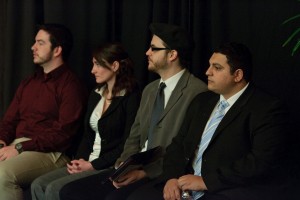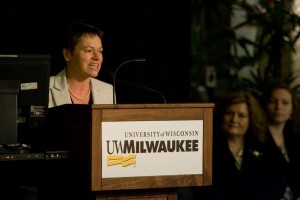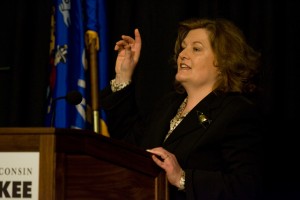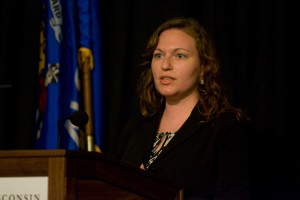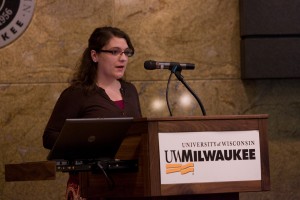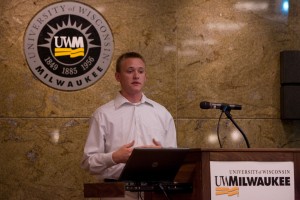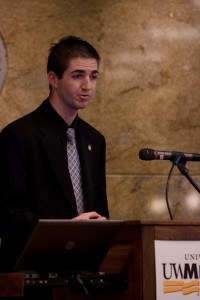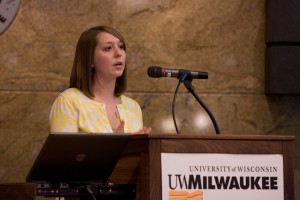MILWAUKEE – In the past few months, two students from the UW-Milwaukee community died as a result of alcohol and drug abuse. Unfortunately, the possibility of a similar tragedy happening on other campuses is something that all UW institutions must confront, said UW-Milwaukee Chancellor Carlos Santiago.
“The challenge before us is substantial…So what do we do?” asked Santiago, who led a presentation on combating alcohol and drug abuse before the UW System Board of Regents Thursday at UW-Milwaukee.
The Make Good Decisions campaign is a central component of the campus’ efforts to safeguard students from alcohol and drug abuse, said Dr. Paul Dupont, Counseling Director of UW-Milwaukee’s Norris Health Center.
The program, funded by a $5,000 grant from the Wisconsin Department of Transportation, is designed for and by students, Dupont said. A key feature of the program is the personally relevant – and anonymous — feedback it provides to students on subjects including how to calculate blood alcohol content, how to keep both themselves and companions safe, how to identify overdoses or other dangerous situations, and what to do if those circumstances arise.
Dupont told the Board that counseling centers face additional challenges with a growing number of students seeking services or information about narcotics or prescription use as well as more students presenting without health insurance.
Santiago added that his recent communication to the campus clarifying that students who solicit help for another student will not be themselves held liable is meant to directly address timeliness of response. In the recent student deaths, “We know students did not respond quickly enough to companions in distress. I wanted to make sure they felt secure enough to do so,” Santiago said.
“We appreciate the efforts you are taking at UW-Milwaukee and those being taken at other UW schools, as well, to combat what truly is a societal problem, one with particularly tenacious roots in Wisconsin,” said Regent Danae Davis.
View presentation on
UW System proposes guidelines to help control textbook costs
In a joint meeting of the Education Committee and Business, Finance, and Audit Committee, Regents approved a set of interim guidelines to bring some immediate relief to students from the rising costs of textbooks. Those guidelines will be presented for approval by the full Board on Friday.
“This is not a new problem but the economic downturn has brought it into greater focus for UW institutions and higher education providers nationally,” said Senior Vice President Rebecca Martin.
Martin emphasized to the Board that the textbook issue is very complex and many competing interests must be balanced.
Martin said that while students bear the greatest impact of textbook costs, attention must also be given to the faculty perspectives on the issue. “Implicit in the faculty’s authority over the curriculum is the right to determine their own syllabi and the appropriate required books/textbooks to support the coursework,” she said. “Faculty members are concerned with the rising costs of textbooks and the financial impact on their students … rapidly changing knowledge in many fields is important issue and this has a significant impact on the selection of textbooks.”
Regent Judith Crain reminded the Board of the need to develop a policy that can change with the times to accommodate technological changes.
Regent Mary Quinnette Cuene acknowledged that frequent adoption of new textbook editions can drive up costs for students, but also wondered, “As a university system, don’t we want our students to have the latest information available?”
Approved recommendations included encouraging all UW institutions to develop and implement schedules for the early adoption of textbooks so students have ample time to shop for the best deals; encouraging those teaching the same course for multiple semesters to use the same textbooks and course materials, or, if newer editions are called for, to highlight the pertinent differences; encouraging unbundled versions of textbooks and course materials; and permitting students to purchase electronic versions of textbooks.
“We need to find a balance between what’s appropriate to require in the policy and the latitude that faculty members require in order to develop the most effective curriculum for the learning objectives that they have set in their courses,” Martin said. “We did want these guidelines to be fairly expansive in order to provide for getting something on the table for the fall, but we’ll be looking for places where we can strengthen them.”
If the interim guidelines are approved by the full Board, they will then be shared with institutional governance groups across the System for their feedback, leading to the development of a formal policy in 2009-10.
That policy will go into effect prior to July 2010, when the federal government will put rules into place requiring additional information on textbooks to be provided to students by textbook publishers and higher education institutions, as part of the Higher Education Opportunity Act of 2008.
See UW System press release on controlling textbook costs
View presentation on
UW-Milwaukee presentation on the role of students in research initiatives
UW-Milwaukee Chancellor Carlos Santiago told the Board that the university is continuing to work toward becoming a “research university of the future” through a number of initiatives, including the physical expansion of the school’s 93-acre campus, and the creation of a School of Public Health, and a School of Freshwater Sciences.
He said that UW-Milwaukee’s Research Grant Initiative (RGI) is providing seed money to help university researchers take important steps to initiate or continue work in their fields. He noted that the university currently offers 29 doctoral programs, and hopes to grow that number to align with the needs of the region.
The campus’s research is critical to economic growth in the Milwaukee region, Santiago said, and students’ research experience is vital in helping provide both an educated workforce and assistance to the local economic community with technology.
Several UW-Milwaukee students shared stories of their own research projects to give the Board a better sense of the broad array of research work being done on the campus.
Michael Brzeski, of Greenfield, a graduate student in UW-Milwaukee’s College of Engineering and Applied Science, told the Board about his research to develop a robot that replicates the motion of a human head for an MRI machine.
“I have an immense amount of opportunities ahead of me. Sitting in a research lab allows me to know that I shouldn’t be afraid of the unknown. Since I’ve tackled something so far beyond the skills that I started with, I know I shouldn’t be afraid to do it again,” Brzeski said.
Argentinian Veronica Rigo, who’ll receive her Ph.D. in Chemistry later this month, spoke about her work with optical-fiber sensors for real-time and remote monitoring of fresh water ecosystems. The work has practical applications including environmental protection, public health and national security, she said.
Joe Sacco, a student in the Peck School of the Arts, showed the Board a short clip from a documentary film that he and fellow students have been working on for two years about a young Hmong woman’s search for identity in Wisconsin and Laos. Sacco, who hopes to be a professor, said he hopes to provide future students with “the same opportunities that I’ve been given.”
Senior Mina Saeed talked about his research experience with pediatric spina bifida. “I’m confident that my experiences in the classroom and laboratories here at UWM have prepared me for medical school and to work as a physician,” he said.
Education Committee delays action on student conduct rule revisions
The Education Committee recommended delaying approval of proposed revisions to two administrative rules covering student conduct and conduct on university property until the June Regents meeting. The Education Committee members said they wanted additional data and further clarification of language in the provisions, particularly a provision related to students’ rights to legal representation at disciplinary hearings.
The proposed changes to Chapter UWS 17 of the State Administrative Code, which addresses conduct of UW System students, along with Chapter UWS 18, which regulates conduct on university lands by students and non-students alike, generated significant feedback and comment at the committee meeting.
The last major revision of both chapters occurred in 1996.
Over the last two years, UW System has sought feedback from the public, university and student representatives on proposed changes, and those revisions were incorporated in the version the Education Committee reviewed.
Much of the lengthy discussion of the proposed changes focused on a provision that would explicitly allow students to be advised at a hearing by a lawyer, and would allows that advisor to speak on a student’s behalf when the student is facing possible suspension or expulsion, or when the student has been charged with a crime in connection with the same conduct that prompted the disciplinary proceeding.
Administrators from UW-Madison, UW-Whitewater, and UW-Milwaukee offices dealing with student conduct argued that bringing attorneys into disciplinary hearings would make the process much more legalistic and structured, and would run counter to the best practices recommended by national professional organizations.
Chynna Haas, a student working with a campus women’s resource and support group at UW-Madison, said that victims of sexual assault might be more reluctant to report those assaults to campus officials if they knew lawyers would be involved in any campus disciplinary process.
Regent David Walsh, however, expressed concern about protecting the rights of accused students, and noted lawyers can be a helpful part of the process of determining the truth at disciplinary hearings. Many students incur significant debt for their education, and being suspended or expelled can seriously impact their future careers, he added.
Regent Thomas Loftus, on the other hand, argued that only those students who could afford attorneys would benefit from proposed changes.
See UW System’s news release on modified conduct rules
Education Committee approves new doctoral programs
In a historic first, the committee recommended approving doctoral programs at two UW System comprehensive campuses, UW-Eau Claire and UW-Oshkosh. The new Doctor of Nursing Practice (DNP) degree, which the two campuses worked together to develop, is designed to address changing professional requirements in the field of nursing and help meet growing workforce demand for healthcare professionals.
The approval marks the first time any of the 11 UW comprehensive campuses have been granted the authority to offer a stand-alone doctoral program. Others have worked with UW-Madison and UW-Milwaukee on collaborative advanced degrees.
Regent Mary Cunene congratulated the two campuses on their joint efforts in developing the doctoral programs. “I really appreciate that this was done collaboratively.”
Regent Judith Crain commented on the programs’ ability to serve adult learners. “I was quite impressed with the 28 credits offered as hybrid or online courses.”
The Education Committee also approved the Ph.D. in Clinical Investigation at UW-Madison.
See UW System’s news release on nursing doctoral programs
View presentations on
and
[pdf]
UW-Milwaukee’s Access to Success program makes strides
UW-Milwaukee Provost Rita Cheng gave Education Committee members an overview of the progress of the UW-Milwaukee’s Access to Success program, an effort to increase student achievement and retention.
The overall initiative is working, said Cheng, and spotlighted several programs within schools and colleges such as the College of Nursing’s Nursing Endeavor program to help at-risk students and the Living Learning Communities to help freshman students feel connected to fellow students and the university.
UW-Milwaukee psychology professor Diane Reddy and teaching assistant Jessica Barnack presented the results they’ve achieved in an introductory psychology course through a self-paced online teaching program called U-Pace.
Textbooks, quizzes, and material in U-Pace courses are the same as in conventionally taught courses. However, U-Pace courses are divided into smaller modules; students move at their own pace and take more quizzes. Students in the U-Pace course can’t move on in the course until they achieve a 90 percent or higher on the quiz for that module.
U-Pace, has helped students succeed academically and increased their overall confidence in their academic abilities, Reddy said.
The 1,700 students who’ve taken Psychology 101 through U-Pace outperform students in conventionally taught courses. U-Pace also reduced the achievement gap between at-risk/disadvantaged students and other students, Reddy said.
In other business, the Education Committee:
- Heard a report from Senior Vice President Rebecca Martin following up on earlier discussions of the final Plan 2008 Report and Inclusive Excellence;
- Approved two appointments to the Natural Areas Preservation Council;
- Approved the appointment of Christine Holmes to the Oversight and Advisory Committee of the UW School of Medicine and Public Health’s Wisconsin Partnership Program;
- Approved the B.S. in Community and Nonprofit Leadership at UW-Madison;
- Approved the Collaborative Online Bachelor of Science in Sustainable Management at UW-Parkside, UW-River Falls, UW-Stout, and UW-Superior, with administrative and financial support from UW-Extension;
- Approved the Master of Science in Technical and Professional Communication at UW-Stout;
- Approved the Master of Physician Assistant Studies at UW-Madison; and
- Approved the UW System’s annual request to the Vilas Trust Estate for support of scholarships, fellowships, professorships, and special programs in music and other areas.
Business, Finance and Audit Committee approves Madison Initiative for Undergraduates
With one member abstaining, the Business, Finance and Audit Committee approved a proposal by UW-Madison to implement an undergraduate differential tuition beginning in fall semester of 2009. The initiative will be presented to the full Board for approval on Friday.
Under the initiative, tuition will increase $250 per year for resident undergraduates and $750 per year for non-resident undergraduates during each of the next four years. The differential will be prorated for part-time students.
UW-Madison Chancellor Biddy Martin told the Committee that the initiative is about “preserving the quality and value of the institution and the degree. It’s as simple as that.” She said a key priority is to make the university more affordable to lower- and middle-income students by providing greater need-based financial aid.
The university currently falls at least $20 million short each year of meeting students’ demonstrated need, Martin said. To address that need, the university will use $10 million of the increased revenue to build a need-based financial aid fund. The university, collaborating with the UW Foundation, will raise private gifts to supplement this amount, expecting to double it.
The Madison Initiative will also provide grants to low- and middle-income students who have demonstrated financial need and adjusted gross incomes below $80,000 to cover the cost of the differential tuition. The university estimates there are approximately 6,100 currently enrolled students whose families make less than $80,000 and who would be held harmless.
Gary Sandefur, Dean of College of Letters and Science, as part of UW-Madison’s presentation to the Committee, outlined some areas potentially impacted by the Madison Initiative.
He said the differential will restore faculty and instructional positions that have been eliminated in recent years. Restoring those positions will help to reduce or eliminate bottlenecks in key gateway courses like chemistry, biology, math, and Spanish. Increasing access to these courses will help students graduate faster, enable students to take prerequisites in the appropriate order and improve access to majors. The initiative also will help to provide additional student services.
Several UW-Madison students addressed the committee regarding the initiative.
Chynna Haas, representing Associated Students of Madison and the first member of her extended family to attend college, told the committee that supporting the initiative would potentially improve the economic diversity of the student body. “There are a lot of students from my hometown not going to college … not because they don’t have the desire or wish to go but because they don’t feel like it’s a place that welcomes them,” Haas said.
T.J. Madsen, currently the ASM student representative from the College of Engineering, where students already pay a differential tuition, said that the more students learned about the benefits of the initiative, the more inclined they were to support it.
Paul Theine, a student in UW-Madison’s School of Business, which also has its own differential tuition, told the committee that fellow business students have seen the tangible benefits – like additional faculty or increased career services – that can come from such investments. “It has created a culture change within the School of Business. It’s kept it solid and strong,” Theine said. He added that alumni giving has also increased in the wake of current students’ willingness to pay more to ensure the continued quality of the program.
UW-Madison junior Allison Wolfe expressed concern, however, that students who oppose the initiative might be ignored. “If we start differential tuition now, where does it stop?” asked Wolfe.
Regent Brent Smith questioned the impact of the Madison Initiative on other comprehensive campuses. Chancellor Martin noted that while increasing enrollment at UW-Madison is an objective, it wouldn’t be done without consultation with other chancellors. “We don’t want to do anything harmful to other campuses,” she said.
Regent Eileen Connolly-Keesler expressed reservations about setting the “hold harmless” ceiling at $80,000, wondering why it shouldn’t be higher. “Eighty thousand is not very high if you have two kids in school,” she said.
Martin noted that the median family income in Wisconsin is $62,000, and the average family income for UW-Madison students is $72,000. “We wanted to have (the ceiling) higher than that to include more middle-income students,” she said.
Speaking in support of the Madison Initiative, President Reilly acknowledged that in a different world, such measures wouldn’t be necessary. “But we have to fulfill our obligations in terms of ensuring affordability, ensuring accountability, and ensuring the quality of what we’re offering our students, now and in the future,” Reilly said.
Reilly called the initiative “a very balanced, thoroughly vetted, thoughtful operational plan that will help ensure access to the Madison campus and help ensure the quality of what goes on there.”
“The flagship campus is the one that everybody watches,” Reilly said. “To a fair extent … as the reputation and the quality of University of Wisconsin-Madison goes, so goes the reputation and quality of the University of Wisconsin System in all of its parts and pieces. So I think this is something we need to do, and it’s something we need to do now.”
View presentation on
In other business, the Business, Finance, and Audit Committee:
- Heard a report from Trust Funds Director Doug Hoerr providing highlights from three peer benchmarking studies;
- Approved the non-routine shareholder proxy proposals;
- Heard a quarterly status report from Julie Gordon, Director of the UW System Office of Operations Review and Audit, on five current projects: implementation of the Excess Credit Policy; energy conservation efforts; UW-sponsored camps and clinics; academic fee audits; and service learning efforts within the UW System;
- Heard a status report on current Legislative Audit Bureau (LAB) projects affecting the UW System, including the annual compliance audit of federal grants and expenditures, and a statewide analysis of the State’s Accountability, Consolidation and Efficiency (ACE) Initiative;
- Heard an update from Freda Harris, Associate Vice President for Budget and Planning, on the latest developments in the Legislative review of the UW System biennial budget;
- Heard a report on quarterly gifts, grants, and contracts for the third quarter;
- Heard a report from Deborah Durcan, Vice President for Finance, on quarterly expenditures;
- Heard a report from Senior Vice President Tom Anderes, providing an update on selected federal legislation as well as the Federal Stimulus Program;
- Approved two seven-year food service contracts with Sodexho Operations, LLC, to provide dining services at UW-Eau Claire and UW-Parkside; and
- Heard an update on the UW-Milwaukee Master Plan.
Capital Planning and Budget Committee
At the Capital Planning and Budget Committee, Associate Vice President David Miller presented a 2009-11 capital budget update and an all agency projects program overview.
At the request of UW System, the committee deferred consideration of a UW-Madison request for authority to execute platting documents, grant utility easements, and transfer land for the development of Research Park II. Development requires the platting of approximately 270 acres of land in the Town of Middleton; the transfer of approximately 62 acres to the city of Madison for streets and water management; the granting of necessary utility easements; and the transfer land to the Research Park.
The proposal will be further reviewed by the city of Madison, University Research Park Inc., State of Wisconsin Department of Administration (DOA) and UW System. The request will be brought back to the committee at a later date.
In other action, the Capital Planning and Budget Committee:
- Approved UW-Madison’s request for authority to seek a waiver to allow the selection of a Design-Build company to design and construct the Physical Plant Shops/Office Building Project;
- Approved UW-Oshkosh’s request for authority to increase the budget of the Elmwood Center Remodeling and Addition Project and construct the project;
- Approved UW-Platteville’s request for authority to purchase a parcel of land and to accept a gift of two parcels of land for the purpose of future road construction;
- Approved UW-Stevens Point’s request for authority to construct a new residence hall enumerated in the 2007-09 capital budget; the project will construct a 323-bed, six-story suite-style residence hall that will replace Hyer Hall;
- Approved UW-Stout’s request for authority to increase the budget of the Hovlid Hall Renovation and Addition project by $600,000;
- Approved UW System’s request for authority to increase the budget of an all-agency maintenance and repair project to renovate the University Houses Preschool on the UW-Madison campus ( );
- Heard an update on the UW-Milwaukee master plan ( ).
Photo Credit: Peter Jakubowski and Alan Magayne-Roshak
###
The Board of Regents will resume its May 2009 meeting on Friday, May 8, at 9 a.m.
at 9 a.m. in the Union at UW-Milwaukee
Related: Read May 8 (day 2) news summary

